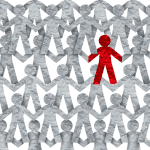
In America’s diverse and complex society, the concepts of honor and shame are more than just abstract ideas; they’re woven into the very fabric of American culture. While these dynamics are often subtle and implicit, they significantly influence our behavior, social norms, and individual self-perception.
Take a closer look at how honor and shame manifest in various aspects of American life. Here are 10 ways.
-
Social Media and Public Perception
The digital age has amplified the impact of honor and shame, particularly through social media platforms. We’re witnessing a virtual stage where individuals seek validation and recognition. A “like,” a “share,” or a positive comment can boost one’s sense of status, while the opposite can lead to public shaming or even “cancel culture,” a modern form of ostracism. This phenomenon reflects a broader societal trend where public perception heavily dictates personal worth.
-
Academic and Professional Achievements
In an achievement-oriented society, academic success and professional accolades are paramount sources of honor. Prestigious job titles, degrees from renowned institutions, and high-profile achievements are often equated with personal value. However, this also means that failure or perceived underperformance in these arenas can lead to a deep sense of shame, impacting one’s self-esteem and social standing.
-
Sports and Athletic Competitions
Sports in America represent more than just games; they are a microcosm of society’s honor-shame dynamics. Victorious athletes and teams bask in the glory of their triumphs, often becoming revered figures. Conversely, defeat, poor sportsmanship, and underperformance can become sources of collective and personal shame.
-
Political and Ideological Affiliations
The polarization of politics in America has turned political affiliations into significant markers of honor or shame. Aligning with certain ideologies can confer a sense of moral high ground and belonging; opposing views are often met with contempt or ridicule. This division underscores the profound impact of political and ideological identities on our sense of honor and shame.
-
Celebrity Culture and Entertainment
In America’s celebrity-driven culture, fame and public adoration are potent sources of honor. However, the public’s fascination with celebrities also means that their downfalls are often subjects of intense scrutiny and public shaming, reflecting the transient nature of honor in the public eye.
-
Economic Success and Consumerism
Wealth and material success are held in high regard and often seen as symbols of personal achievement and social worth. Yet, there’s a darker side to this narrative–– poverty and financial struggles can be unfairly stigmatized, leading to a sense of shame and social exclusion.
-
Cultural and Ethnic Identity
The rich tapestry of cultures and ethnicities in America can be a source of immense pride and honor. However, instances of racism and discrimination reveal that certain identities can be unjustly linked with shame, highlighting the ongoing challenges of inequality and bias.
-
Military Service
Military service in America is esteemed as a noble and honorable sacrifice for the nation. But issues like veterans’ mental health and homelessness point to a social failure to adequately honor those who served, creating a dichotomy between the respect for service and the shame of neglect.
-
Legal and Criminal Justice System
Adherence to the law is respected and honored, while involvement in the criminal justice system, whether justly or unjustly, often carries a stigma and shame, reflecting social views about crime and punishment.
-
Community Service and Philanthropy
Engaging in community service and philanthropy is highly respected; it’s seen to reflect one’s commitment to social welfare and ethical values. This aspect of American culture underscores the belief in giving back and making a positive impact.
Conclusion
Understanding the nuances of honor and shame in American culture offers valuable insights into our societal structure and individual behaviors. It challenges us to reflect on how these dynamics shape our perceptions and interactions, encouraging a more empathetic and inclusive approach to our diverse society.
Today, or this week, have a conversation with a friend or family member to consider where you see honor-shame dynamics at work around you and in your church.













